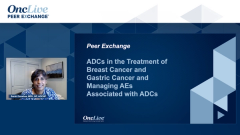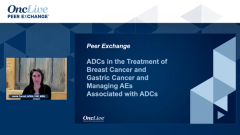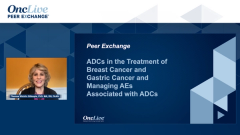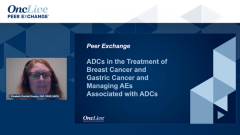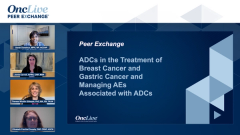
Selecting Appropriate Patients with MBC for T-DXd and Counseling for AEs
Comprehensive insight to the selection and education of patients for whom ADC therapy is an option in breast or gastric cancers, with regard for pulmonary risk status.
Episodes in this series

Transcript:
Sarah Donahue, MPH, NP, AOCNP: Theresa, you mention in your case later for any patient you have who may have lung metastases and you’re considering putting on trastuzumab deruxtecan, are there certain patients you’re more concerned about or who you wouldn’t put on trastuzumab deruxtecan because of their pulmonary status? Do you have any thoughts about that?
Theresa Wicklin Gillespie, PhD, MA, RN, FAAN: I think one thing to consider is that gastric cancer is generally a disease of older people; it is less common in young people. And so, you already have people who are older, oftentimes with other comorbid conditions, and maybe their performance status is not great. And of course, they’ve all been pretreated with something else. You have to evaluate, is this person a good candidate for this kind of systemic therapy? Is there something else we might give in place of that? And look at the options and discuss that with the person. But if they are in relatively good performance status and don’t have a lot of comorbid conditions and don’t have something like COPD [chronic obstructive pulmonary disease] or other kinds of problems. I would say we evaluate each person individually. There’s no blanket thing, but we definitely look at performance status, and other comorbid conditions, and polypharmacy, and all the things that you would want to pay attention to, particularly if there’s going to be any impact on respiratory function.
Sarah Donahue, MPH, NP, AOCNP: Jamie, have you had any patients with breast cancer who you have not recommended trastuzumab deruxtecan to because of their pulmonary status? Can you think of a patient?
Jamie Carroll, APRN, CNP, MSN: I think that we have several options in metastatic breast cancer on different therapies. If you have a patient who has an underlying lung disease, then it might not be the best treatment right now. Maybe in future lines; we know from the study that we could use it in the third line and beyond. So, yes, we’ve recently moved it up to the second line. But if we’ve got underlying lung conditions where we’re hesitant to use it, we can use it in the future. I’ve got a patient right now who has rheumatologic issues involving her lungs, so we’re questioning whether; she’s on treatment that’s working right now, but when she progresses, do we use trastuzumab deruxtecan? I think it’s reasonable to consider, as long as you let the patient know what we’re concerned about with interstitial lung disease.
Sarah Donahue, MPH, NP, AOCNP: Just making sure they report to you any change in their already existing respiratory symptoms. Are there any drug interactions within the gastric cancer world, Liz, that you have to think about when you’re putting a patient on trastuzumab deruxtecan?
Elizabeth Prechtel Dunphy, DNP, CRNP, AOCN: There are none in particular that I can identify. In the PI [product information], it notes that coadministration of CYP3A4 inhibitors over multiple doses can increase the drug’s AUC [area under the curve]. But it has not been clinically meaningful, and 2 of the drugs that were looked at were itraconazole and ritonavir. But the data in the end showed that it was not clinically meaningful, so there’s not anything in particular. We of course look at their medications, but there’s nothing that has been flagged.
Sarah Donahue, MPH, NP, AOCNP: I haven’t had to change anything because of drug interactions with my patients on this medication. So that’s a good thing. And many of the antinausea medications don’t interact with it, so I don’t have to adjust those. Pretty much anything I need, I can use for this treatment.
Transcript edited for clarity.


